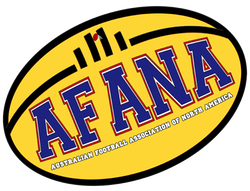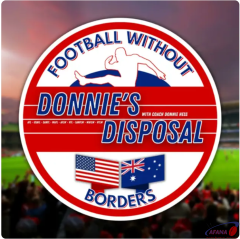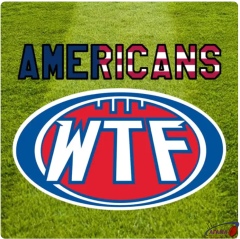by Lisa Albergo reporting for AFANA from Chicago
As suspended Eagle Ben Cousins prepared to depart for a rehab facility in the USA, the league met last week to decide what to do - if anything - about Eagle Daniel Kerr being overheard on police tapes speaking with a drug dealer. Kerr could yet face sanctions under the player code of conduct.
A police spokesperson said that, at the time of the recordings four years ago, Kerr was not subjected to investigation as the police were targeting dealers, not users. And the Eagles have decided not to take any action against Kerr as he - along with several other Eagles - admitted to drug use but have promised to clean up their acts after watching Cousins crash and burn.
The AFL does have the power to deregister a player for bringing the game into disrepute. However, that authority has been exercised only once - in 1985 when Leigh Matthews, playing for Hawthorn, was banned after an off-the-ball hit on Geelong's Neville Bruns. Matthews was banned for four weeks and also charged with assault and fined $1000. It is the only time in league history a player was charged by police for an on field incident. That hit was only one of a number of spiteful incidents during the game with five players being reported on 17 charges. Ironically, Matthews was not one of them. His court conviction was overturned a year later.
Andrew Demetriou also released a lengthy open letter defending the league's drug policy against criticisms which have come from the federal government. Prime Minister John Howard, Treasurer Peter Costello, and federal Sports Minister George Brandis have all been critical of the policy's "three-strikes" clause, saying it is not tough enough. Brandis said giving players two chances before being named publicly on a third positive test did not represent a zero-tolerance policy.
But Demetriou, in his letter, stressed that the AFL was the only sporting body which tested players out of competition as well as in competition. He also quoted several experts who have praised the AFL's approach, which emphasizes counseling, education, and rehabilitation rather than shame and condemnation.
The league will also begin random tests of players the day after games in a bid to curtail the use of illegal substances on Friday and Saturday nights. Players believed to have a history of drug use will be heavily targeted and it is believed the AFL will conduct more tests over the course of the season.
Since the drug policy was introduced in 2005, players were not tested the day after games, but the new testing will make it harder for players to escape detection with some drugs being detectable for just a few days. One of those drugs is an methamphetamine - referred to on the street as crystal meth or "ice", which is believed to have been Cousins drug of choice.
In 2003 and 2004, 31 positive tests were recorded. That figure was the catalyst for the current policy which was introduced in 2005. Within the next 18 months, 24 positive tests were returned, with three players testing positive on two occasions.
From February 2006 through February of 2007, only nine positive tests were recorded, down from 19 in the previous 12 months. No player tested positive on game days under WADA's code, which oversees in-competition testing only. Such a positive test would result in a Tribunal appearance and an automatic two year suspension.
Of the 28 positive tests in the last two years, three players had tested positive on two occasions, but no player had two positive results in 2006. Approximately 490 tests were conducted in each 12 month period.
A prominent Melbourne social worker, Les Twentyman of Melbourne Open Family, has called for national summit to address the use of the amphetamine ice, which he called "the filthiest drug he had seen...in 40 years of social work." According to Twentyman, ice can make users erratic, paranoid, delusional, and violent. He said it was causing street violence to rise and, because of its effects on users, posed a danger to doctors, ambulance officers, police, and social workers. Not to mention the general public being at risk.
Twentyman said ice was made cheaply and sold cheaply, making it readily available and the problem was everywhere.
Source: Melbourne Age, The Australian, & ninemsn.com.au, The Clubs (book), 100 Years of Australian Football (book)
As suspended Eagle Ben Cousins prepared to depart for a rehab facility in the USA, the league met last week to decide what to do - if anything - about Eagle Daniel Kerr being overheard on police tapes speaking with a drug dealer. Kerr could yet face sanctions under the player code of conduct.
A police spokesperson said that, at the time of the recordings four years ago, Kerr was not subjected to investigation as the police were targeting dealers, not users. And the Eagles have decided not to take any action against Kerr as he - along with several other Eagles - admitted to drug use but have promised to clean up their acts after watching Cousins crash and burn.
The AFL does have the power to deregister a player for bringing the game into disrepute. However, that authority has been exercised only once - in 1985 when Leigh Matthews, playing for Hawthorn, was banned after an off-the-ball hit on Geelong's Neville Bruns. Matthews was banned for four weeks and also charged with assault and fined $1000. It is the only time in league history a player was charged by police for an on field incident. That hit was only one of a number of spiteful incidents during the game with five players being reported on 17 charges. Ironically, Matthews was not one of them. His court conviction was overturned a year later.
Andrew Demetriou also released a lengthy open letter defending the league's drug policy against criticisms which have come from the federal government. Prime Minister John Howard, Treasurer Peter Costello, and federal Sports Minister George Brandis have all been critical of the policy's "three-strikes" clause, saying it is not tough enough. Brandis said giving players two chances before being named publicly on a third positive test did not represent a zero-tolerance policy.
But Demetriou, in his letter, stressed that the AFL was the only sporting body which tested players out of competition as well as in competition. He also quoted several experts who have praised the AFL's approach, which emphasizes counseling, education, and rehabilitation rather than shame and condemnation.
The league will also begin random tests of players the day after games in a bid to curtail the use of illegal substances on Friday and Saturday nights. Players believed to have a history of drug use will be heavily targeted and it is believed the AFL will conduct more tests over the course of the season.
Since the drug policy was introduced in 2005, players were not tested the day after games, but the new testing will make it harder for players to escape detection with some drugs being detectable for just a few days. One of those drugs is an methamphetamine - referred to on the street as crystal meth or "ice", which is believed to have been Cousins drug of choice.
In 2003 and 2004, 31 positive tests were recorded. That figure was the catalyst for the current policy which was introduced in 2005. Within the next 18 months, 24 positive tests were returned, with three players testing positive on two occasions.
From February 2006 through February of 2007, only nine positive tests were recorded, down from 19 in the previous 12 months. No player tested positive on game days under WADA's code, which oversees in-competition testing only. Such a positive test would result in a Tribunal appearance and an automatic two year suspension.
Of the 28 positive tests in the last two years, three players had tested positive on two occasions, but no player had two positive results in 2006. Approximately 490 tests were conducted in each 12 month period.
A prominent Melbourne social worker, Les Twentyman of Melbourne Open Family, has called for national summit to address the use of the amphetamine ice, which he called "the filthiest drug he had seen...in 40 years of social work." According to Twentyman, ice can make users erratic, paranoid, delusional, and violent. He said it was causing street violence to rise and, because of its effects on users, posed a danger to doctors, ambulance officers, police, and social workers. Not to mention the general public being at risk.
Twentyman said ice was made cheaply and sold cheaply, making it readily available and the problem was everywhere.
Source: Melbourne Age, The Australian, & ninemsn.com.au, The Clubs (book), 100 Years of Australian Football (book)
Article last changed on Sunday, April 01, 2007 - 6:18 PM EDT
Comments
Posted by gordman on December 17, 2007







Well it looks like drugs still remain a serious problem, they keep hitting our by taking victims and destroying lives. I am very skeptical about that, I can't see the end of this any time soon. I think the best approach in this case is to track for dealers and then handle the users. I am still waiting for the big fish...